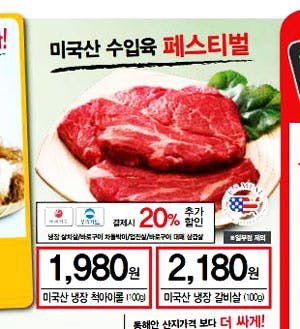Sales Competition Boosts U.S. Beef at Korean Grocery Chain

While sales of U.S. beef in South Korea have been on the upswing this year, USMEF has identified a niche in that country’s economy – small and mid-size supermarkets – that should help the rebound continue. That niche was the focus of a recent sales competition, and the early returns show very encouraging signs for both current and future U.S. beef sales.
E-Mart Everyday, a chain of 165 smaller-scale stores that operates under the umbrella of Korea’s largest retailer, $9.4 billion E-Mart, collaborated with USMEF-Korea recently on a contest among the chain’s meat department employees to see which store could sell the most American beef. The competition, supported by the Beef Checkoff Program and E-Mart Everyday’s own sales promotions, featured chilled U.S. chuck eye roll, top blade, rib finger, hanging tender, brisket point and short plate.
Prior to the competition, U.S. beef accounted for 4 percent of E-Mart Everyday’s beef sales. During the contest, U.S. beef sales rose to 70 percent of overall beef register rings. And the contest is proving to have staying power: post-contest U.S. beef sales at the chain are hovering at 25 percent, a six-fold increase over pre-contest levels.
“This is the kind of result we strive for,” said Jihae Yang, USMEF-Korea director. “Our first goal is to raise awareness among consumers who may not be familiar with U.S. beef by getting them to try it. And by promoting a variety of cuts that have different price points and can be utilized in local dishes, we give customers a reason to keep coming back – and stores a reason to keep promoting U.S. beef.”
The sales competition graded the E-Mart Everyday stores on total U.S. beef sales, sales growth, and the share of U.S. beef versus competitors in the imported meat section. Staff at the top three stores received E-Mart gift cards.

The meat department staff at E-Mart Everyday stores did not have much interest in U.S. beef before the competition, reports Choi Hunyoung, meat buyer for the Korean chain. Australian beef has dominated the market in recent years, in part because of its longer shelf life. The sales competition has helped change the opinion of store employees, and Choi believes this will result in an ongoing greater presence of U.S. beef in the chain’s stores.
“Another positive result of this contest is that E-Mart Everyday is looking for additional suppliers that can offer U.S. beef cuts in modified atmosphere packaging (MAP),” said Yang. “Because of the high costs in the back room of supermarkets’ meat departments, they like to get products in MAP, and the portion of those sales is expanding.”
USMEF-Korea has focused increasingly on the smaller and mid-sized supermarkets because the superstores (E-mart, Homeplus, Lottemart and Costco) have saturated the market and are limited by government regulations. They also are required by local governments to close twice each month to help support local retailers.
“Smaller supermarkets are located in neighborhoods,” said Yang. “Their sales are smaller when compared to the superstores, there are many more of the smaller stores.”
Through the first four months of 2014, U.S. beef sales to South Korea are up 28 percent in value ($256.2 million) over 2013 levels on 1 percent lower volumes (37,481 metric tons or 82.6 million pounds). The trend has been up in each of the last three months, with sales to Korea in April up 27 percent in volume and 53 percent in value.
Chilled U.S. beef is helping to drive the growth. Based on Korean customs clearance data, chilled beef accounted for 9.6 percent of total U.S. beef exports to that nation in May 2014 versus 8.3 percent two years ago.
